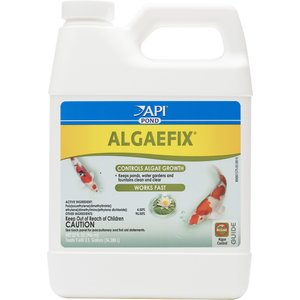Best Pond Algaecide & Pond Algae Killer (Safe for Fish)
Pond Academy is reader-supported. Buying through links on our site may earn us an affiliate commission. As an Amazon Associate I earn from qualifying purchases.
Pond algaecide is extremely effective at killing algae in ponds.
And it kills all kinds of algae, including the more troublesome string and blanketweed algae, extremely fast!
But… algaecides can also be bad for your pond's fish and ecosystem.
With that in mind, let's look at the best pond algaecide products on the market today, how to apply them for the best results, and cover some frequently asked questions.
Product Comparison Chart
*Buying through links in this chart may earn us a commission at no additional cost to you.
Get Our Best Pond Tips Sent to Your Inbox for Free!
Join thousands of others and learn from our decades of pond building and maintenance experience! Your pond will thank you!
By subscribing you agree to receive emails from PondAcademy.com. We will always respect your privacy and you can unsubscribe at any time.
Best Algaecide for Ponds
Pond algaecides come in different types, use different ingredients, and some are meant for only specific types of algae. Let's review the four best pond algaecide products to find the best one for your pond and situation.
GreenClean Algaecide
GreenClean is a granular algaecide that works especially well on string algae (though it should work for all forms). It breaks down algae cells on contact through the power of oxidation resulting in visibly less algae in as little as 24 to 48 hours!
This pond algae treatment is free from harsh chemicals such as chlorine, copper, and phosphate. And like all the algaecides in our list, GreenClean is EPA approved and safe for fish and plants when used according to the manufacturer's directions.
If your pond or lake suffers from string or blue/green algae, then GreenClean will be your best bet.
Specifications
Eliminates: All forms of algae, but designed for string algae and blue-green algae
Active Ingredients: Sodium Carbonate Peroxyhydrate – 42.5%
Fish Safe: Yes
EPA Registered: Yes
Cutrine Plus Algaecide
Cutrine Plus is a professional-grade algaecide used for small backyard ponds up to larger farm ponds, lakes, reservoirs, hatcheries, etc.
Cutrine Plus is a liquid algaecide perfect for all algae types and works fast - within 1 to 2 days. Plus, it contains chelated copper, which is designed to help control algae well after it's applied.
It's safe for koi, goldfish, and trout if the water hardness is less than 50PPM (You can check with a pond water test kit). You can even fish, swim, and/or drink water immediately after treating with this product!
Specifications
Eliminates: All forms of algae, including planktonic, filamentous, and chara
Active Ingredients: Copper Ethanolamine Complex – 27.9%
Fish Safe: Yes
EPA Registered: Yes
API Pond ALGAEFIX Algae Control
API Pond ALGAEFIX will help control the most popular types of pond algae, including green or green water algae, string or hair algae, and blanketweed.
ALGAEFIX pond treatment is registered with the EPA and is safe for pets, fish, and live plants in ponds.
When using this product (and most other algaecides), ensure you have proper aeration setup to avoid fish kills from oxygen deprivation.
Specifications
Eliminates: Green water algae, string or hair algae, and blanketweed
Active Ingredients: dimethyliminoethylene dichloride, ethoxylate – 4.5%
Fish Safe: Yes
EPA Registered: Yes
Microbe-Lift Algaway 5.4 Algaecide
Microbe-Lift Algaway 5.4 Algaecide was designed to remove many types of algae from ponds and water fountains and improve the water quality.
This pond algae killer is EPA registered and is safe for fish and pond plants as long as you follow the directions. If you have a koi or fish pond, be sure to have proper water aeration setup to avoid fish kills from oxygen deprivation.
A 1-gallon bottle will treat up to 45,424 gallons of pond water.
Specifications
Eliminates: Green water algae, string or hair algae, and blanketweed
Active Ingredients: Poly[Oxyethylene (Dimethyliminio) Ethylene (Dimethyliminio) Ethylene Dichloride] – 5.4%
Fish Safe: Yes
EPA Registered: Yes
How to Use a Pond Algaecide for Best Results
To help ensure you don't run into any of the negative effects of using an algaecide in your pond, here are our “best practices” to follow so you get the best results.
- Follow the Product Directions
First and foremost, ALWAYS follow the directions on the product package exactly as described. This should be obvious, but not following the directions exactly, whether you meant to or not, can lead to fish kills and other issues with your pond. Be mindful of each step and double-check your doses before adding them to your pond. - Proper Pond Aeration
To maintain adequate oxygen levels in your pond during treatments, you'll want to make sure you run an aerator, especially if you have fish in your pond. You can add an air pump to pump oxygen directly into the water or add a fountain, a pond spitter, or a waterfall to help oxygenate the water.
- Treat Your Pond In Sections
Whenever you use any chemical products in your pond, it's good to treat it in small sections. This is a popular practice when trying to get rid of pond weeds, as well. By treating in sections, you'll effectively reduce the chances of overtreating your pond with algaecide, and it will help keep the water oxygen levels within an acceptable range. - Remove Dead Algae
Algaecide is extremely effective at killing algae in pond water. And it works really fast! The bad news is that the dead algae will just sink to the bottom of your pond, adding to your pond's sludge problem and increasing the number of harmful chemicals like ammonia and nitrites in your pond. To make matters worse, those harmful chemicals also fuel the growth of new algae! The easiest ways to clean up the dead algae are with a pond vacuum or a pond rake.
- Keep Your Pond Filter Clean
The algae that don't sink to the floor of your pond, will end up in your pond filtration system. While this is a good thing, if you have a lot of dead algae getting pumped into your filter, it will get clogged up very quickly. So, check and clean your filter often when using algaecides.















